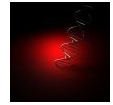BRCA Gene Testing
BRCA gene testing consists of a blood test that utilizes DNA to analyze and identify mutations (changes) in either the BRCA1 or BRCA2 genes. A mutation in either of these genes can increase the risk of certain cancers, specifically breast cancer and ovarian cancer. This test is for women who have a very high risk of ovarian and breast cancer, specifically those with a strong family history of these two cancers or a personal history of one or both cancers. This genetic test is not routine for women with an average risk of breast or ovarian cancer. BRCA gene mutation is rare, affecting approximately 1 in 1,000 people. Only about five to ten percent of breast cancers and about ten to fifteen percent of ovarian cancers develop due to inheriting a BRCA gene mutation.
Purpose of BRCA Gene Testing
BRCA gene testing is done to determine if a BRCA gene mutation is present. Those who may benefit from having this test done to determine if they have this gene mutation include:
- Those with a personal history for breast or ovarian cancer at a young age
- More than one generation of breast cancer in their family history
- A family member that has experienced both ovarian and breast cancer
- Frequent occurrence of ovarian cancer in the patients family
- Being of Ashkenazi Jewish ancestry
- Having at least two close relatives who had breast cancer at a young age
- Having a male relative who had breast cancer
- Having a family member who had bilateral breast cancer
- Having a relative who had a BRCA1 or BRCA2 test what was positive
BRCA Gene Test Process
Before any testing occurs, the patient will first meet with a genetic counselor to determine if this test is appropriate.
To test for a mutated BRCA gene, the patient will go through a simple blood test. A medical professional will clean the injection site with alcohol, tie a tourniquet around the arm about two inches above the injection site, insert a needle into a vein, allow the tube to fill with an adequate amount of blood to sample, remove the tourniquet, place a cotton ball or small piece of sterile gauze on the injection site, remove the needle, and apply pressure to the injection site for a few seconds. This entire process takes less than ten minutes.
It will take approximately three to four weeks to get the results of this test. Once the results are in, patients will almost always meet with their genetic counselor for their results, to discuss the significance of the results, and to discuss the patients options.
Options for Patients Whose Test is Positive
If a patients BRCA gene test comes back positive, they will certainly have some things to think about. There are ways to completely eradicate the risk of developing both breast and ovarian cancer, but these are major surgeries that may not be for everyone.
Some women do decide to have their ovaries removed (often along with all of their other reproductive organs with a hysterectomy), some decide to have their breasts removed (double mastectomy) and then plastic surgery to replace their breasts, and some women choose to do all of the above.
Some women will choose to increase their breast cancer screenings (mammograms) to twice a year and have ovarian ultrasounds at least once a year in hopes of any ovarian masses being caught in the early stages if they are cancerous.
Some women will just take the watchful waiting approach and continue with their annual screenings and general health physical.
The choice a woman makes if she discovers she has the BRCA gene must be thought through very carefully and all risks and benefits must be carefully weighed. A genetic counselor can be very beneficial in helping women make the right decision for them. It can also be helpful to meet with a gynecologist as well.
Resources
Mayo Clinic. (2008). BRCA Gene Test for Breast Cancer. Retrieved on June 25, 2010 from the Mayo Clinic: https://www.mayoclinic.com/health/brca-gene-test/MY00322
Lab Tests Online. (2009). BRCA-1 and BRCA-2. Retrieved on June 25, 2010 from Lab Tests Online: https://www.labtestsonline.org/understanding/analytes/brca/test.html
Image Credits
DNA: svilen001 – sxc.hu
